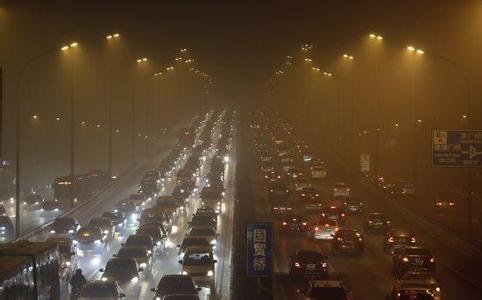Beijing ranks low on green list of cities
 0 Comment(s)
0 Comment(s) Print
Print E-mail China Daily, February 13, 2014
E-mail China Daily, February 13, 2014
The Chinese capital is on the verge of being "unfavorable for human living", a report claims.
Beijing fared poorly in the report that ranked the environmental conditions and general living suitability of 40 global cities, with conditions in the capital, especially, being severely criticized.
 |
|
Vehicles move slowly amidst heavy smog on the East Third Ring Road in Beijing on Jan. 12, 2013.?[File photo] |
The city came second to last, while China's other major city in the study, Shanghai, was fifth from last in the environment category of the report, which was released on Wednesday.
Beijing was "almost unfavorable for human living", according to the report by the Shanghai Academy of Social Sciences, while Shanghai could barely meet average standards of an environmentally friendly city.
Stockholm, Vienna and Zurich were the top three cities in terms of their environment, and Moscow was at the bottom.
The report found that Beijing and Shanghai were in the top 10 for social tolerance, and both were in the top 20 in the business rankings as well as market stability and attraction.
Environmental conditions were one of the six indexes used to evaluate the 40 cities. Other indexes included economics, governance and cultural innovation. Overall, Shanghai came 21st and Beijing 31st.
Geographic conditions and unique weather patterns played a factor in the environment, said Su Ning, associate research fellow of the academy's Institute of World Economy.
Air pollution has been a major problem for big cities in China. In 2013, more than 100 cities had an average of 29.9 smoggy days, a 52-year high.
Of the 10 worst cities for monthly air pollution, cited by the Ministry of Environmental Protection last year, more than a quarter were located in Hebei province, which surrounds Beijing.
Soaring levels of pollution are driving expatriates out of Chinese cities, and dissuading others from coming. The Associated Press reported that the number of overseas visitors to China had declined from early last year due to air pollution.
"Air pollution is a fact, along with the ever-increasing length of the traffic jams," said Markus Wenger, who works in an e-commerce company in Shanghai.
"My firm has just offered to buy us all home air filters as long as the cost is under 10,000 yuan ($1,650)."
A recent analysis led by the Boston-based Health Effects Institute estimated that outdoor particulate matter in China was responsible for roughly 1.2 million premature deaths in China in 2010, ranking just behind smoking.
Both the central and municipal governments have prioritized tackling air pollution.
Under a plan released by the central government on Tuesday, the density of inhalable particulate matter is expected to be reduced by at least 10 percent in major cities by 2017. PM2.5, particles that are 2.5 micrometers or smaller in diameter, should also drop by 25 percent from 2012 levels in the capital by that year.
Toward solutions
Commenting on the report, Ni Pengfei, researcher of the Urban Competitiveness Research Center of the Chinese Academy of Social Sciences, said, "The next step after the release of this report is for the government to take action based on the research."
"Without promoting change, such rankings, either good or bad, make no sense," Ni said.
Follow China.org.cn on Twitter and on Facebook to join the conversation.





